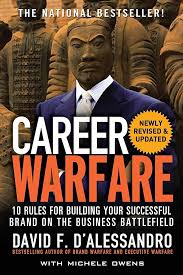“Career Warfare: 10 Rules for Building a Successful Personal Brand and Fighting to Keep It” is another insightful book by David F. D’Alessandro, building on the brand theme, but this time focusing on personal branding in the context of one’s career. Here’s a synopsis and Critical Analysis.
Synopsis of “Career Warfare: 10 Rules for Building a Successful Personal Brand and Fighting to Keep It” by David F. D’Alessandro
In “Career Warfare,” D’Alessandro dives deep into the concept of personal branding in the corporate world. Drawing from his extensive experience climbing the corporate ladder, he offers readers a candid look at what it takes to build a powerful personal brand and, equally important, how to protect and maintain it.
The book is structured around ten essential rules for building and defending a strong personal brand:
- Everyone Has a Personal Brand, Like It or Not: D’Alessandro begins with the fundamental idea that everyone, consciously or not, carries a personal brand. The key is to recognize it and cultivate it intentionally.
- Decide What You Want to Stand For: Clearly defining your values and what you represent is crucial in establishing a recognizable and memorable personal brand.
- Be Aware that Appearances Matter: In the corporate world, how you present yourself, from attire to demeanor, plays a significant role in how others perceive your brand.
- Learn to Play Offense: Taking initiative and being proactive, rather than simply reacting to situations, can set you apart from the crowd.
- Achievements Alone Won’t Help: D’Alessandro emphasizes the importance of not only achieving but also ensuring those achievements are visible to key stakeholders.
- Never Let Personal Weaknesses Go Public: Protecting one’s brand means addressing and managing personal weaknesses privately.
- Be Careful with whom You Associate: The company you keep can influence how others perceive your personal brand.
- Understand the Company’s Culture: Recognizing and adapting to corporate culture is pivotal in navigating a successful career and maintaining a strong personal brand.
- In Times of Change, Everything is Up for Grabs: During times of corporate transitions, individuals have the opportunity to redefine and strengthen their personal brands.
- When You’re in a Hole, Stop Digging: When faced with challenges or mistakes, it’s crucial to recognize them, address them, and move forward constructively.
Throughout the book, D’Alessandro uses personal anecdotes, experiences, and stories from other corporate leaders to bring to life the rules he presents, making “Career Warfare” a relatable and pragmatic guide for professionals at all stages of their careers.
D’Alessandro’s “Career Warfare” serves as a manual for those aiming to understand and navigate the intricacies of corporate dynamics, focusing on the pivotal role of personal branding in achieving success.
Critical Analysis of “Career Warfare: 10 Rules for Building a Successful Personal Brand and Keeping It” by David F. D’Alessandro
Strengths:
- Rich Anecdotal Insights: One of the standout features of “Career Warfare” is D’Alessandro’s use of personal anecdotes and experiences. This narrative approach brings abstract concepts to life and offers readers a firsthand look at the realities of corporate dynamics.
- Universal Relevance: While rooted in D’Alessandro’s own experiences, the ten rules he presents have a broad applicability. Professionals across various industries and career stages can benefit from his insights on personal branding.
- Holistic Approach: D’Alessandro doesn’t just focus on building a personal brand. He equally emphasizes its maintenance, evolution, and defense, providing a well-rounded perspective on the subject.
- Pragmatic and Actionable: The rules and strategies presented in the book are not just theoretical but are paired with actionable steps, making them immediately applicable for readers.
Areas for Improvement:
- Corporate-Centric: While the book’s principles can apply across various industries, its heavy focus on corporate dynamics might make it less relatable for professionals in non-corporate fields, like freelancers, artists, or nonprofit workers.
- Temporal Relevance: Given the rapid evolution of workplace dynamics, especially with the rise of remote work, gig economy, and digital branding post-2021, some advice might seem slightly dated or less relevant to newer generations.
- Subjectivity: While personal anecdotes enrich the narrative, they also bring in the subjectivity of the author’s experiences. Some assertions might reflect D’Alessandro’s personal experiences and biases more than broader truths.
- Lack of Diverse Perspectives: The book could benefit from a wider range of experiences and examples beyond D’Alessandro’s own journey. Incorporating diverse voices would offer a more comprehensive view of personal branding in varying contexts.
Conclusion:
“Career Warfare” provides a valuable roadmap for professionals looking to establish and maintain a strong personal brand in the corporate world. David F. D’Alessandro’s blend of personal stories with actionable advice offers readers a unique and insightful guide. However, as with any advice, readers should consume it critically, adapting the principles to their unique contexts and the evolving landscape of the professional world.
